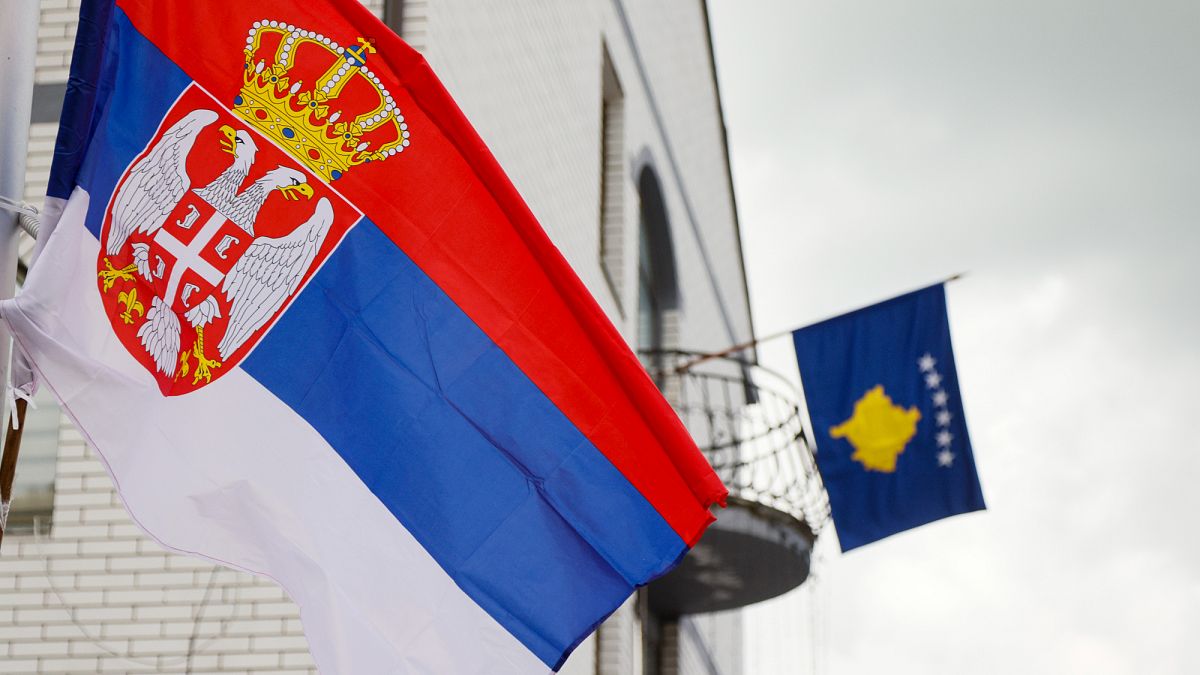By Euronews
Published on
Kosovo’s Prime Minister Albin Kurti has launched a renewed attack on Serbia’s largest telecom operator, Telekom Serbia, accusing it of waging what he called “a hybrid war” against Kosovo, with the company responding by saying it has been a frequent target for the authorities in Pristina.
A false bomb alert triggered the evacuation of the Kosovo parliament in Pristina last week, prompting Kurti to share a Facebook post by Interior Minister Xhelal Sveçla, who claimed that the phone number behind the threat was registered in Serbia and belonged to Telekom Serbia’s mobile operator MTS.
Kurti praised the Kosovan authorities for their “prompt response” in the investigation and repeated his past claims that the incident reaffirmed the existence of Serbia’s ongoing hybrid war against Kosovo.
The company’s management stated that it has been subjected to repeated attacks and pressure from Kosovo leaders in recent times.
Vladimir Lučić, CEO of Telekom Serbia, strongly rejected the bomb threat incident accusations in a statement to Euronews Serbia, describing them as “an absurd and shameful attack on a company that has long been a thorn in the side of the Pristina authorities for two years.”
He said the attacks are taking place almost daily as a form of wider political pressure, including a failed attempt to shut down its presence in Kosovo two years ago, which was stopped after the international community’s intervention.
Lučić added that Telekom Serbia operates in accordance with the law and international agreements, including the Brussels Agreement, according to which the company has 28 base stations in areas where ethnic Serbs live in Kosovo, while its headquarters and technical infrastructure are located in Belgrade.
Brussels chooses not to step in
A former province of Serbia, Kosovo declared independence in 2008, which Belgrade has so far refused to recognise. More than 100 countries have recognised its independence — but not the likes of Russia, China and five EU member states.
Since 2011, Brussels has facilitated a dialogue between the two countries designed to decrease tensions and resolve bilateral issues — which is also one of the requirements for both countries’ progress along their path toward full-fledged EU membership.
However, the two leaders — Kurti and Serbian President Aleksandar Vučić — have failed to participate in trilateral meetings with EU representatives since May 2023, casting doubt on the effectiveness of the Brussels dialogue as a means to find solutions to outstanding issues.
When asked by Euronews for a reaction to the Kosovo leader’s statements on Telekom Serbia and the operator’s claims of repeated attacks, the European Commission chose not to address the developing political implications but instead referred to the technical framework.
“Compliance with the Kosovo regulatory framework is the responsibility of the independent regulatory authority for electronic and postal communications,” the European Commission said in a statement to Euronews.
Anouar El Anouni, a spokesperson for the European External Action Service (EEAS), said that the matter falls under the jurisdiction of Kosovo’s national authorities and that telecommunications compliance is the exclusive responsibility of Kosovo’s independent regulatory authority.
El Anouni also recalled that under the EU-facilitated dialogue, agreements on telecommunications were reached in 2013 and 2015 to normalise operations. These agreements enabled MTS to operate legally in Kosovo.
Big hopes from Washington
Meanwhile, the CEO of Telekom Serbia is counting on US support to obtain a third 5G licence in Kosovo, which was agreed upon by Pristina as part of an international deal but was then repeatedly refused.
Serbia has been hoping that US President Donald Trump can decrease regional friction by promoting economic cooperation and growth — something Serbian Foreign Minister Marko Đurić said last week officials in Pristina have failed to adopt.
At the same time, Kosovo President Vjosa Osmani praised Trump for his role in de-escalating tensions between Kosovo and Serbia in recent times.
“We have the continued support of the United States, and President Trump was very clear that he was the person who stopped Serbia from continuing its efforts,” she said at a recent event at Johns Hopkins University in Washington.
“I am very convinced that (war) has been stopped thanks to America’s role and its direct involvement in preserving and protecting peace,” Osmani added.
Meanwhile, these and other similar statements have sparked a reaction from Richard Grenell, the former US special envoy for Serbia and Kosovo negotiations, who said Osmani was misinterpreting Trump’s remarks, making it seem as though Serbia was about to go on an offensive against Kosovo.
“Shame on Vjosa Osmani for manipulating President Donald Trump’s words,” Grenell said in a post on X.
Read the full article here


